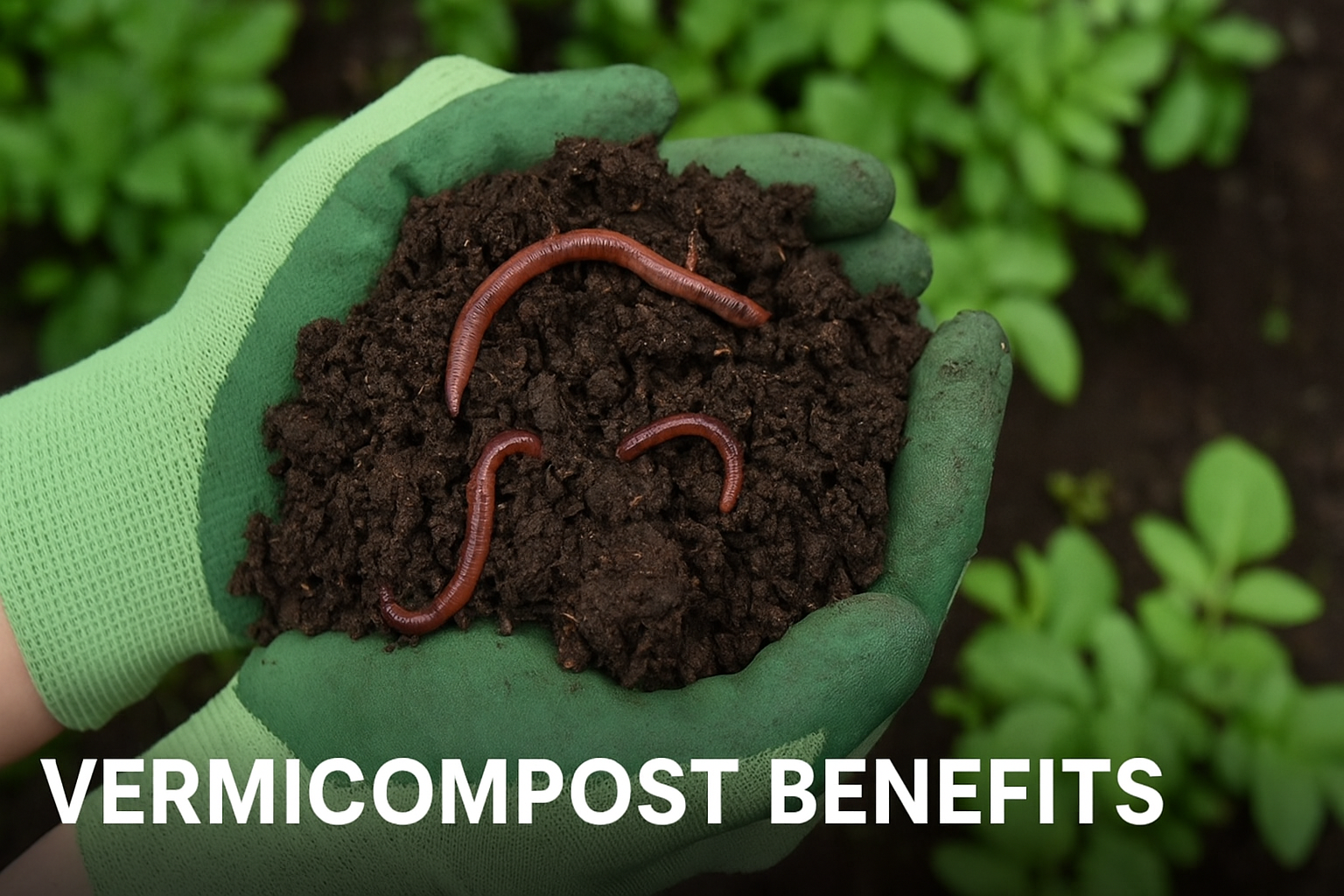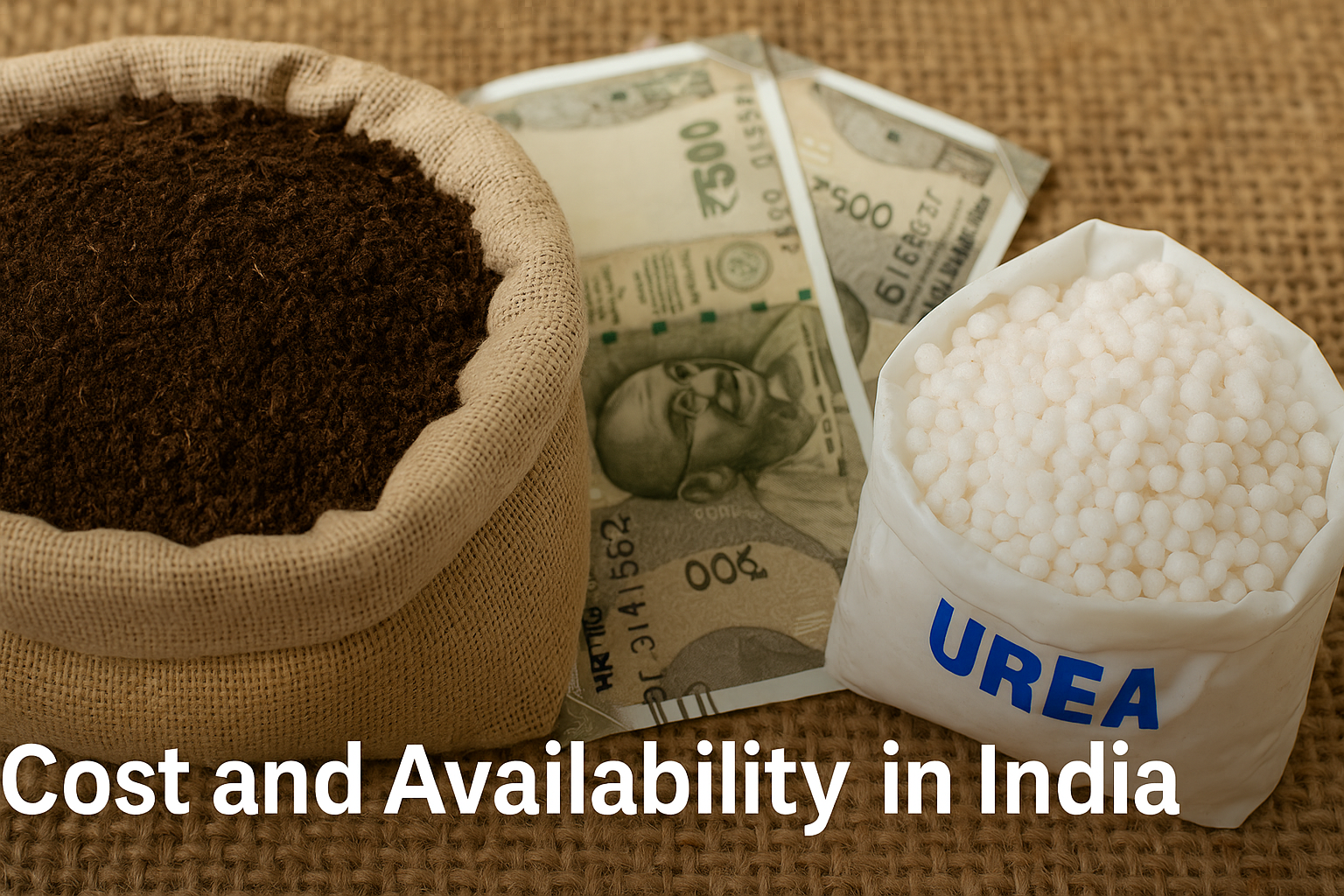.jpg)
If you’re an Indian home gardener or agri-student, you’ve probably wondered about the vermicompost benefits versus using chemical fertilizers.
Both can help plants grow, but they work very differently. In this article, we’ll chat about what vermicompost and chemical fertilizers are, compare their effects on plant health and soil improvement, and see which one comes out on top for your garden.
We’ll also look at costs in ₹ (rupees), availability in India, long-term environmental impacts, and even special cases like hydroponics and managing kitchen waste.
By the end, you’ll know exactly which fertilizer type suits your needs – and we’ll suggest a great product from Urban Plant to get you started!
What is Vermicompost?
Vermicompost is basically organic compost produced with the help of earthworms. Imagine a bin of moist organic waste (like kitchen scraps, cow dung, dry leaves) with dozens of worms happily munching away.
The worms digest the waste and excrete vermicast, a nutrient-rich dark material that looks and feels like fine soil
Vermicomposting is faster than regular composting and operates best in a moderate temperature range (worms like 10–32°C).
The end result is vermicompost, an organic fertilizer loaded with plant nutrients, beneficial microbes, and humus. It’s often called “black gold” by gardeners because of how it boosts soil fertility and plant growth.
Vermicompost also has substances like humic acids and growth hormones that can stimulate plant growth and improve resilience.
In short, it’s a natural, eco-friendly fertilizer that improves both your plants and your soil.
Read More Gardening Tips
How to Grow Chrysanthemum (Guldaudi) Seeds at Home | Step-by-Step Care Guide
How to Balcony Home Garden Makeover on a Low Budget: Ideas and Case Study
Vermicompost Benefits for Plant Health and Soil

So, what are the key vermicompost benefits that gardeners rave about?
Let’s break down how vermicompost positively impacts your plants and soil:
- Improves Soil Quality: Vermicompost enriches the soil with organic matter, which enhances soil structure and texture. It makes heavy soils looser and sandy soils better at holding moisture. The result is well-aerated, porous soil that roots love.
- Increases Nutrient Availability: Worm compost is packed with essential nutrients in plant-available forms. It slowly releases nitrogen, phosphorus, potassium (NPK), and micronutrients as plants need them.
- Boosts Plant Growth and Health: Studies show vermicompost can boost crop productivity and even improve the nutritional quality of produce.
- Enhances Pest and Disease Tolerance: A well-nourished plant is a healthy plant. The microbes and natural compounds in vermicompost can help plants fend off certain pests and diseases.
- Environmental and Long-Term Benefits: Vermicompost helps sequester organic carbon in the soil and reduces the need for chemical inputs. It’s a climate-friendly practice – recycling waste into fertilizer, cutting down on landfill garbage, and reducing chemical runoff.
In essence, using vermicompost is like nurturing your soil so that your soil can nurture your plants. It’s a win-win: your plants get nutrition and your soil gets better with each application, rather than getting depleted.
Chemical Fertilizers: Quick Growth, but Consider the Trade-offs
Chemical fertilizers are synthetically produced nutrients, primarily including nitrogen (urea), phosphorus (DAP), and potassium (NPK).
Though effective in rapid plant growth, they have potential downsides like soil degradation and environmental pollution.
These fertilizers are typically concentrated salts or granules that deliver nutrients like N, P, K in a very readily available form.
Cost and Availability in India

Cost is often a deciding factor, especially for larger gardens or farms.
Let’s compare vermicompost and chemical fertilizers in the Indian context in terms of price and availability:
Vermicompost Price Per Kg
In India, vermicompost price per kg can vary widely. Bulk vermicompost (e.g., from local farmers or wholesale) might cost around ₹5–₹30 per kg, whereas branded, retail packs (online or in garden stores) range around ₹10–₹50 per kg.
For example, a 5 kg bag of good-quality vermicompost might sell for ₹300–₹500 (which is ₹60–₹100 per kg) depending on the brand and quality.
Chemical Fertilizer Price
Chemical fertilizers are generally cheaper per kg of nutrients, thanks to subsidies. For instance, the most commonly used fertilizer, urea, is subsidized by the government – a 45 kg bag of urea costs about ₹242 only.
(that’s roughly ₹5.4 per kg!). This is extremely cheap for the amount of nitrogen it provides. Other fertilizers like DAP, NPK mixes, etc., are pricier than urea but still subsidized (e.g., a 50 kg bag of DAP might be around ₹1200, or ₹24 per kg).
In summary, cost vs value is the consideration: chemical fertilizers are cheaper upfront for nutrients, but vermicompost offers long-term value by enhancing soil (potentially reducing other costs like soil conditioners or crop protection).
Soil Improvement and Long-Term Effects
One of the biggest differences between vermicompost and chemical fertilizer is how they affect your soil in the long run.
- Soil Structure: Vermicompost acts like a soil conditioner. The humus in vermicompost helps bind soil particles into aggregates, improving tilth (crumb structure) and preventing compaction. This means better root penetration and aeration.
- Soil Fertility and Microbial Life: Each batch of vermicompost introduces billions of beneficial bacteria, fungi, and actinomycetes into the soil. These microbes continue breaking down organic matter, fixing nutrients, and even producing natural antibiotics that keep plant diseases in check.
- Long-Term Yields and Sustainability: As mentioned earlier, long-term exclusive use of chemicals can lead to declining yields.
- Environmental Impact: There’s also the bigger picture to consider. Chemical fertilizers, when overused, can lead to runoff that pollutes rivers and lakes (causing problems like algal blooms) and leaching of nitrates into groundwater (a health hazard).
In the long run, using vermicompost regularly can turn your garden into a self-sustaining ecosystem. Your soil becomes rich enough that plants require less frequent feeding, and you might rarely see issues like soil crusting, erosion, or nutrient lock-out.
Comparison Table: Vermicompost vs Chemical Fertilizer
| Aspect | Vermicompost (Organic Fertilizer) | Chemical Fertilizer (Synthetic) |
|---|---|---|
| Composition | Worm castings, organic matter, beneficial microbes | Inorganic salts like urea, DAP, NPK |
| Primary Nutrients | Moderate NPK with micronutrients in organic form | High % of targeted nutrients (e.g. 46% N in urea) |
| Nutrient Release | Slow and steady release through microbial activity | Instant availability but risk of nutrient leaching |
| Effect on Plant Growth | Promotes strong roots, balanced growth | Quick shoot growth, risk of overfeeding |
| Soil Improvement | Improves structure, aeration, and moisture retention | No structural benefits; may degrade soil over time |
| Soil Biodiversity | Boosts microbes and earthworms | Can harm beneficial soil organisms |
| Environmental Impact | Eco-friendly, reduces landfill and runoff | Pollution risk via runoff and emissions |
| Cost (India) | ₹10–₹50/kg retail; cheaper in bulk or homemade | ₹5–₹25/kg; subsidized, cheaper per nutrient |
| Usage & Application | Mix with soil or top-dress; beginner-friendly | Requires precise dosing; risk of burns |
| Best For | Home gardens, pots, organic farming | High-yield farms, hydroponics, fast-growing crops |
| Long-Term Outcome | Improves soil, reduces external inputs over time | Dependency risk, soil fatigue possible |
Use Cases: Which One to Use for What?
- Home gardens & organic terrace farming: Opt for vermicompost to maintain soil health.
- Fast-growing leafy vegetables: Initial use of a small amount of chemical fertilizer can be supplemented by regular vermicompost applications.
- Large-scale agriculture: A balanced approach is recommended, though moving towards organic solutions enhances sustainability.
Why Urban Gardeners in India Prefer Vermicompost
Urban gardeners favor vermicompost because:
- It revitalizes often-depleted urban soils.
- It's safe, sustainable, and cost-effective.
- Easily available and manageable even in confined urban spaces.
NPK of Vermicompost vs DAP vs NPK Fertilizer
| Fertilizer Type | N (Nitrogen) | P (Phosphorus) | K (Potassium) |
|---|---|---|---|
| Vermicompost | ~1.5% | ~0.7% | ~1.2% |
| DAP (Di-Ammonium Phosphate) | 18% | 46% | 0% |
| NPK Fertilizer (19:19:19) | 19% | 19% | 19% |
While vermicompost NPK is lower, it improves microbial life and overall soil health, which chemical fertilizers often damage.
Final Verdict: Organic is the Future
Considering environmental, health, and long-term soil sustainability, vermicompost emerges as the superior option.
Its advantages in promoting healthier soil and plants make it essential for urban gardeners aiming for sustainable living.
Where to Buy the Best Vermicompost in India?
Urban Plant offers premium quality vermicompost that’s odor-free, double-filtered, and pest-resistant.
Available conveniently in packs of 1 kg, 5 kg, and 10 kg, it meets all gardening needs efficiently.
Frequently Asked Questions
How much vermicompost should I use for my home plants?
Use around 200-250 grams per medium-sized pot every 15-20 days.
Can I mix vermicompost with chemical fertilizers?
Yes, though minimal chemical fertilizer is advisable, as vermicompost sufficiently meets nutritional needs.
Does vermicompost really make a difference?
Absolutely. Gardeners notice visible improvements in plant health, growth, and flowering within weeks.
What is the best time to apply vermicompost?
Apply during morning or evening hours to avoid harsh sunlight.
Is it safe for vegetable plants and edible herbs?
Yes, vermicompost is completely safe and beneficial for edible gardening.
What is the difference between vermicompost and fertilizer?
Vermicompost is an organic product made from earthworm composting, while fertilizers are synthetic nutrient additives. Vermicompost enriches soil; fertilizers often degrade it over time.
What is the NPK value of vermicompost?
Typically, vermicompost contains around 1.5% Nitrogen, 0.7% Phosphorus, and 1.2% Potassium, along with microbes and micronutrients.
Is vermicompost better than DAP or chemical fertilizer?
For long-term sustainability and safety, vermicompost is better. DAP has higher phosphorus but lacks the organic matter vermicompost provides.
Can I use both vermicompost and fertilizer together?
Yes, but use fertilizers in moderation and combine them with vermicompost to balance nutrition with soil health.
Conclusion
Choosing vermicompost isn't just about fertilizing plants—it’s about nurturing the soil sustainably for generations to come.
In India's urban gardening context, opting for organic fertilizers like vermicompost offered by trusted providers such as Urban Plant makes practical, ecological, and financial sense.
Your garden deserves natural nourishment, and vermicompost delivers exactly that.





